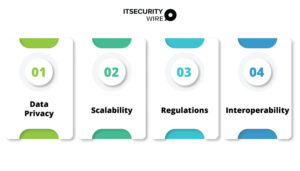There is no cyber defense mechanism or information system that is 100% foolproof. The cybercrime industry is going through a tremendous shift. Blockchain offers huge advantages, but there are pitfalls in keeping businesses secure.
Cybercriminals are exploring opportunities to target victims and accomplish their malicious goals. The surge in the adoption of Blockchain and its applications across various industries has raised some doubts. A few industry veterans are concerned about its scalability, security, and sustainability.
The core functionalities of Blockchain offer data confidentiality, integrity, and accessibility. So, security decision-makers plan to integrate Blockchain into their cybersecurity tech stack. This will allow the SecOps teams to secure their IT infrastructure against external attacks.
Many cybersecurity industry veterans are exploring opportunities to embrace Blockchain in Cybersecurity. It will revolutionize the SecOps processes and add resiliency, transparency, and security.
However, Blockchain has a few inherent pitfalls that expose businesses to risk when used in cyber security.
Following are a few challenges of embracing Blockchain as a part of Cybersecurity:
Blockchain Pitfalls in Cybersecurity

Enterprises and regulatory bodies around the world are exploring blockchain-based cybersecurity opportunities. A few industry veterans consider it the next big thing in Cybersecurity.
However, integrating Blockchain in the cybersecurity tech stack is not as simple as updating an application. Integration of Blockchain technology and Cybersecurity will be a constant process.
Most Blockchain application research does not align with business needs. Without an effective adoption strategy, the entire implementation plan can fail.
1. Data Privacy
All the parties in the public Blockchain can see and retrieve transaction data. It becomes an issue for enterprises that want to govern what data they share with the public.
Permission-based Blockchain tools can minimize privacy issues. The best enterprise Blockchain platform provider can only develop a permission-based Blockchain network. It will only allow access to trusted parties to view or retrieve transactions.
2. Scalability
Scalability is a limitation while adapting to this technology in Cybersecurity. Scalability becomes a limitation because of the block size and response times. Blockchain stores each node and processes and monitors transactions in a block. It is one of the most effective ways to ensure security and privacy.
A few businesses might find it challenging once the transaction number increases in a block. As the transaction number increases, it will slow the validation process. Enterprises with limited computing & storage resources will find it challenging to adopt decentralization.
3. Regulations
Enterprises are still struggling to determine the Blockchain’s structure. They are also trying to determine the complexity of the changing data privacy, compliance, and regulatory landscape.
European Union’s (EU) General Data Protection Regulation (GDPR) and similar laws allow users to demand to delete their data. Under the “right to be forgotten” law of GDPR, users can request to delete their data whenever they want.
Blockchain restricts parties from updating or erasing data, so the technology will violate the compliances.
4. Interoperability
A few Blockchain platforms utilize a vast ecosystem for their smart contract framework, transaction schemes, and consensus algorithms.
Poor interoperability restricts scalability. For developers, roadblocks can also arise from platform misconfiguration or interaction mistrust.
Additionally, roadblocks might arise from specification mistakes in application development and cross-chain smart contract framework errors.
Reimagining a Stronger Blockchain as a Cybersecurity Boon

Embracing Blockchain to secure IT infrastructure will open new opportunities for businesses. This technology has a unique approach to strengthening security that most cybercriminals do not mess with.
It minimizes vulnerabilities, offers better encryption, and verifies data ownership and integrity vigilantly. Adopting Blockchain will eliminate the weakest link in Cybersecurity which is the password. A distributed ledger is one of the most significant advantages of integrating Blockchain.
A shared public key infrastructure framework minimizes multiple risks related to centrally saved data by reducing the most expected targets.
Blockchain stores the transactions across every single node on the network. This makes it challenging for cybercriminals to steal, modify, or tamper with data.
Such events are only possible if a vulnerability exists at the network level, which is rare.
A collaborative consensus algorithm helps to overcome all the traditional weaknesses. Integrating Blockchain in the cybersecurity tech stack will enable faster detection of suspicious activities, anomalies, and false positives without a central authority.
Also Read: Strategies And Technologies for Strong Cybersecurity
Cybercriminals might successfully fool one system but find it too difficult to fool all. As a result, Blockchain helps to strengthen verification and protect data interactions and record management.
Even though Blockchain has a few inherent nontraditional functionalities, encryption is one of its strongest capabilities to strengthen Cybersecurity.
The shared ledger can leverage public key infrastructure to protect interaction and verify devices. Moreover, this tool can also be useful for enforcing configuration changes and identifying confidential devices in an Internet of Things (IoT) environment.
Blockchain can be a resilient defense mechanism against distributed denial-of-service (DDoS) attacks. Businesses can embrace Blockchain-driven domain name systems (DNS). These direct internet marketing protocols will extract all the single points that enable such attacks to succeed.
Blockchain has tremendous capabilities to strengthen the security of the IT infrastructure. However, Blockchain’s few potential inherent pitfalls restrict its capabilities in the cybersecurity landscape. Security decision-makers must consider these pitfalls before embracing Blockchain in their cybersecurity tech stack.
For more such updates follow us on Google News ITsecuritywire News. Please subscribe to our Newsletter for more updates.









